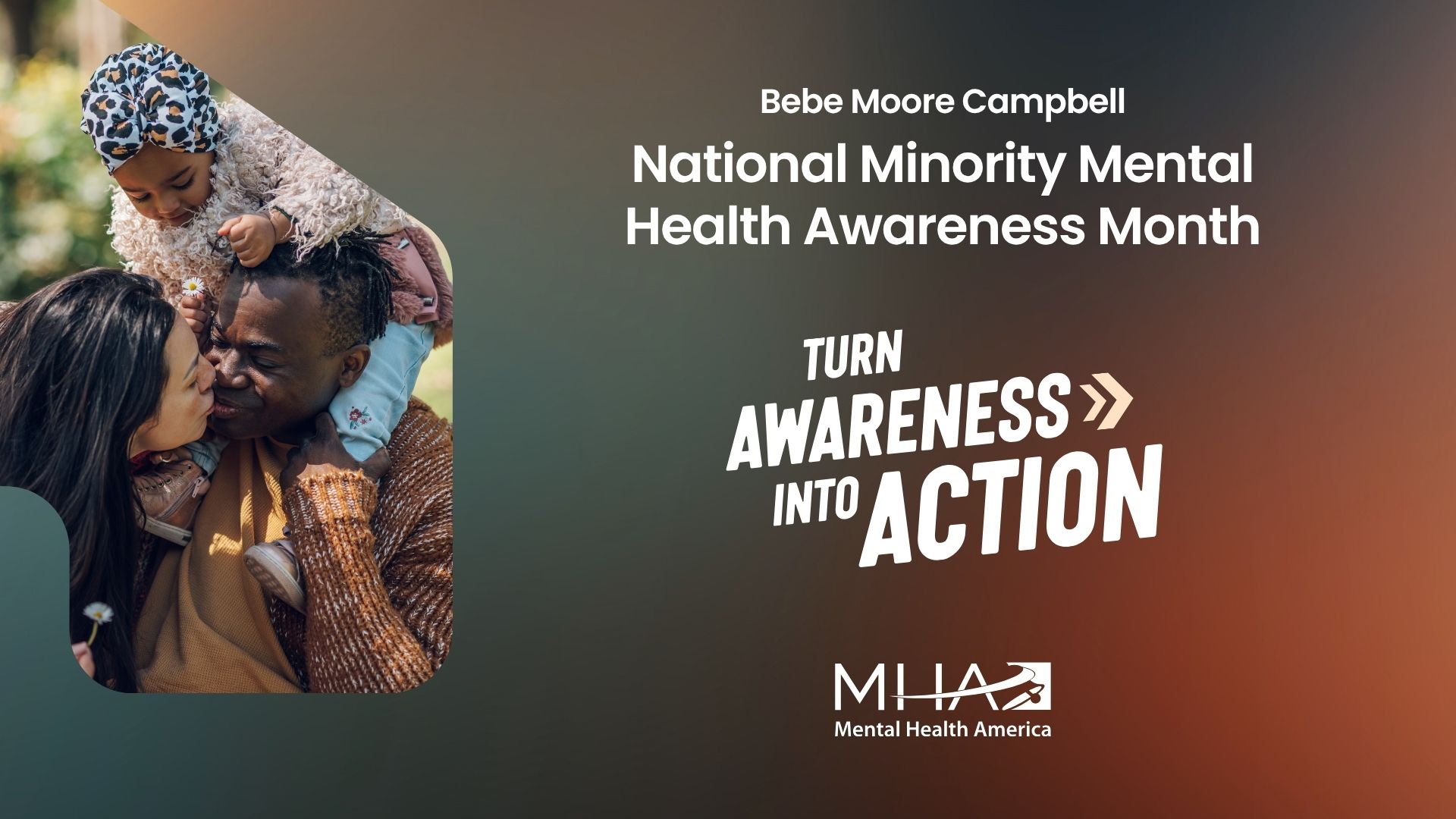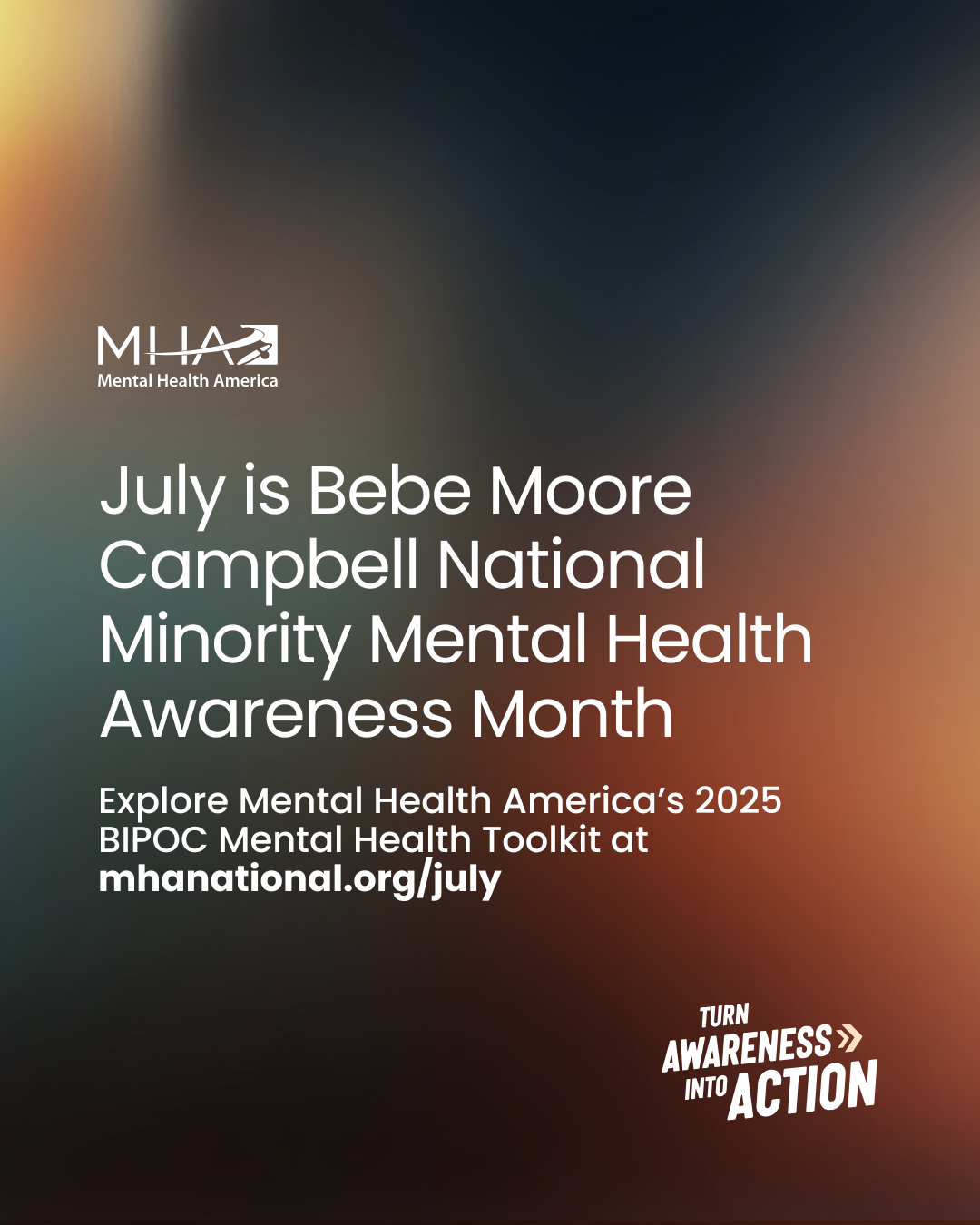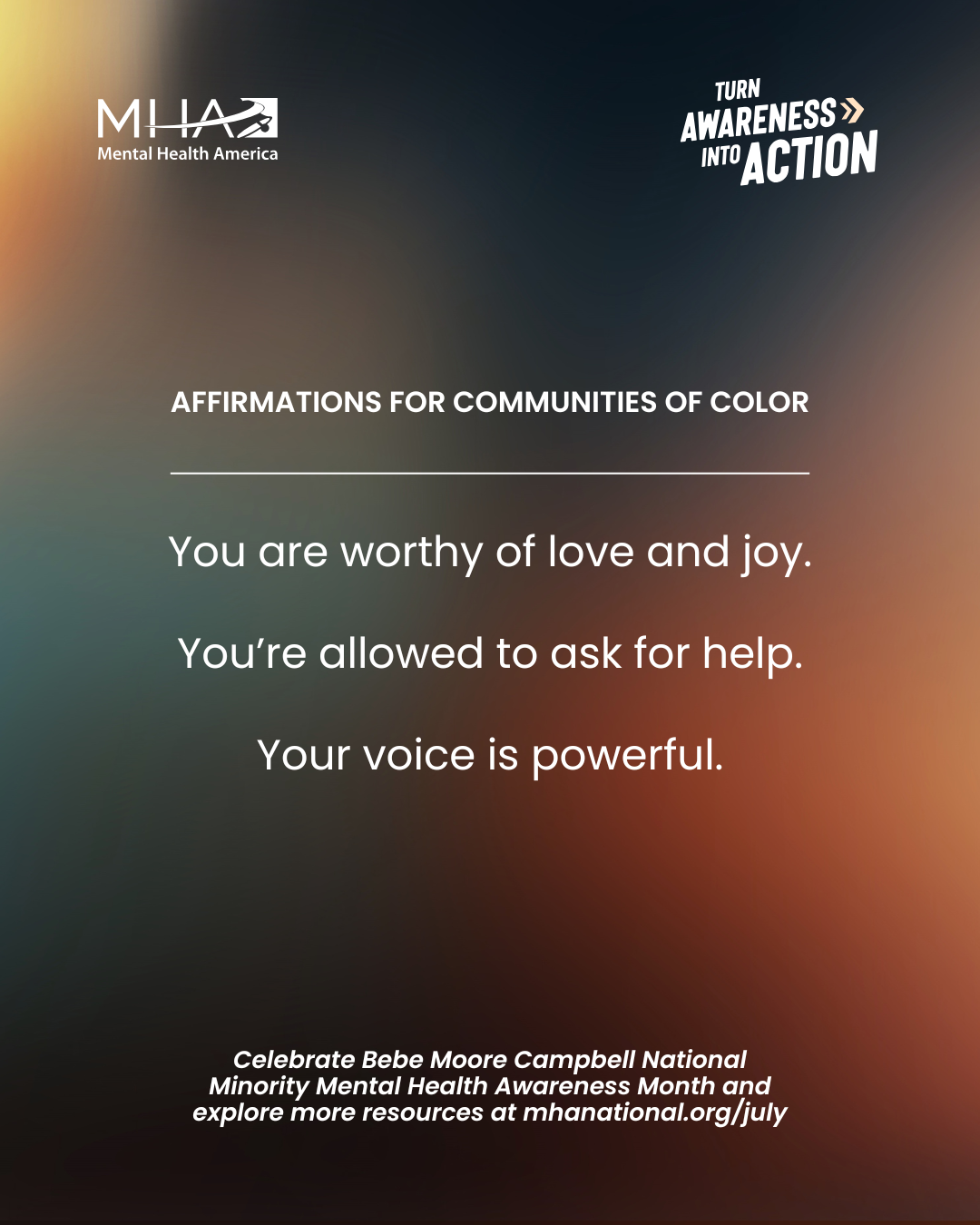
Bebe Moore Campbell National Minority Mental Health Awareness Month
Each July, we honor the legacy of author, advocate, and trailblazer Bebe Moore Campbell by recognizing Bebe Moore Campbell National Minority Mental Health Awareness Month (also referred to as BIPOC Mental Health Month). Moore Campbell’s ability to tell impactful stories highlighting themes of racism, mental health, and family left a lasting mark on this world and is a foundation for much of the work that continues in support of Black, Indigenous, and people of color (BIPOC) mental health.
Learn more about Bebe Moore Campbell
Turn awareness into action this July
MHA’s 2025 BIPOC Mental Health Toolkit was designed to help individuals and organizations in communities of color turn awareness into action. Whether you’re looking for ways to feel better or do better, you’ll find resources that support action in three key areas:
Take care of yourself
Explore ways to strengthen your mental health through practices that reflect your values, your culture, and your needs.
- Worksheet: Naming your strengths
- Worksheet: Healing traditions
- Worksheet: How to cope when your community is under attack
- Resource list (PDF)
- Reading list (PDF)
Find and take care of your community
From casual check-ins to structured support spaces, connection is a powerful tool for healing. We’ve included ideas to help you build and nurture those bonds.
- Finding community
- Quick tips: Actions for improving mental health in communities of color
- Worksheet: Creating a community safety and connection plan
Advocate
Use your voice and your vote to make mental health a priority in the places you live, work, learn, and worship.
- Quick tips: Advocate for mental health at work, school, or in your community
- Worksheet: Advocating for better community spaces
Let this toolkit be a starting point. However you choose to engage, your actions matter. Change is possible, and it begins with us.
Download our BIPOC Mental Health Month Toolkit
Toolkit is available in English and Spanish
Learn more about BIPOC mental health
Culture, ethnicity, and race all play a role in the way that each person experiences the world. These factors, among others, have profound effects on mental health, especially for Black, Indigenous, and people of color (BIPOC). MHA’s BIPOC Mental Health Resource Center helps you learn more about the strengths and challenges communities of color face when it comes to mental well-being and mental health care.
Graphics and printables
We’ve created sample text and graphics to make it easy for you to turn awareness into action for BIPOC mental health throughout the month.
Don’t forget to tag us!
Instagram: @mentalhealthamerica | X: @mentalhealtham
Facebook: mentalhealthamerica | LinkedIn: mental-health-america
Graphics


Sample social media post text
July is Bebe Moore Campbell National Minority Mental Health Awareness Month. 🧡
Learn more about #BIPOCMentalHealth at mhanational.org/july.
Explore Mental Health America’s #BIPOCMentalHealth Toolkit to learn about mental health in BIPOC communities: mhanational.org/july.
Mental Health America’s 2025 #BIPOCMentalHealth Toolkit is now available!
Join us in celebrating Bebe Moore Campbell National Minority Mental Health Awareness Month at mhanational.org/july.
Looking for #BIPOCMentalHealth resources?
Check out Mental Health America’s BIPOC Mental Health Resource Center at mhanational.org/bipoc.
This July, we’re joining MHA in honoring the memory of Bebe Moore Campbell, a mental health advocate who worked to shed light on the mental health needs of the Black community and other underrepresented communities.
Learn more: mhanational.org/bebemoorecampbell
Talking about mental health in communities of color means uplifting cultural strengths, honoring healing traditions, and recognizing how resilience is shaped by lived experiences.
Learn more about supporting #BIPOCMentalHealth at mhanational.org/july.
There is power in showing up for each other, whether it’s through shared meals, honest conversations, or helping hands.
Mental Health America’s #BIPOCMentalHealth Toolkit has the resources you need to start building your community: mhanational.org/july
Mental health isn’t just about what’s going on inside. It’s also shaped by how we’re treated, what we have access to, and what’s expected of us. For BIPOC communities, these factors can have an even bigger impact on mental health.
Learn more at mhanational.org/bipoc.
Reminders for communities of color:
You are worthy of love and joy.
You are allowed to ask for help.
Your voice is powerful.
🧡
Explore #BIPOCMentalHealth resources at mhanational.org/july
Three actions you can take for #BIPOCMentalHealth during Bebe Moore Campbell National Minority Mental Health Awareness Month:
🔸 Take care of yourself.
🔸 Take care of your community.
🔸 Advocate for change.
Learn more: mhanational.org/july
The first step in navigating your mental health is to check in on yourself. Take a free #mentalhealth test at mhascreening.org.
#BIPOCMentalHealth
Taking a mental health test is one of the easiest ways to check in on your #mentalhealth. Get screened at mhascreening.org.
#BIPOCMentalHealth
If you or someone you know is struggling or in crisis, help is available. Call or text 988 or chat 988lifeline.org. You can also reach the Crisis Text Line by texting HELLO to 741741.
Hashtags
- #BIPOCMentalHealth
- #BebeMooreCampbell
Links
Printables
- Finding community
- Quick tips: Advocate for mental health at work, school, or in your community
- Actions for improving mental health in communities of color
- Worksheet: Healing traditions
- Worksheet: Naming your strengths
- Worksheet: How to cope when your community is under attack
- Worksheet: Advocating for better community spaces
- Worksheet: Creating a community safety and connection plan
- BIPOC mental health resources
- BIPOC mental health reading list
- Posters: July
- Posters: Screening
- Posters: BIPOC resources
Take a mental health test
 If you or a friend are struggling with your mental health, take an anonymous, free, and private mental health test. It only takes a few minutes, and after you are finished, you will be given information about the next steps you can take based on the results.
If you or a friend are struggling with your mental health, take an anonymous, free, and private mental health test. It only takes a few minutes, and after you are finished, you will be given information about the next steps you can take based on the results.
This campaign is supported by a contribution from Otsuka America Pharmaceutical, Inc.
